
As you are probably all aware I have been reading through the papers of Samuel Hartlib, over the past month or so. I am consistently rewarded with interesting nuggets of information about early modern medicine, health and bodies. Now Hartlib was by no means representative of everyone’s experiences at this time, but nonetheless his papers and letters do reveal something of how people learnt about medicine, acquired useful information and attempted to treat themselves.
One such snippet recorded in Hartlib’s Ephemerides (a diary or journal, a record of daily occurrances) for 1650, noted the story of a man who managed to use his own misfortune to his advantage. This short tale not only highlights the frustrations some patient’s had with trained physicians, but shows that in such situations learning from a book or developing one’s own skills were seen as just as valuable as a university education.
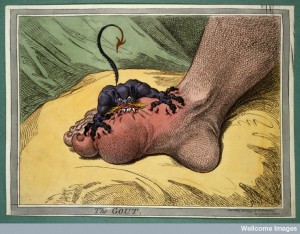
Credit: Wellcome Library, London. Wellcome Images
The story was as follows:
‘One Woddard a Shop-keeper of pitch tarre etc. about Billings-gate fell sick of the Gout and continued so in grievous torments for a great while. And having tried in vaine all kind of Physitians, there came once a Booke-woman casually by his house asking whither hee would buy any Book’s. Hee not greatly entertaining the Motion yet at last, hearing of some Physick Book’s, bought one of them for 6.d. enquiring whither it had any remedy against the Gout. That which afterward hee found in it, hee presently tried vpon himself and cured himself perfectly of it. Since hee hath beene so famed that a great number of Persons are come to him, whom also hee hath cured with the same medecin, and gotten a great deale of mony by it. But the Receipt hee keepes yet secret though it seemes to bee a very slight thing a kind of ointment or the like which must bee rubbed in taking away the swelling paines etc. Hee is altogether illiterate and know’s nothing else to prescribe. An old woman of Canterbury, of Dr Childs acquaintance, was likewise by him cured.’1
Particularly interesting in this little tale is the fact that Woddard found his famous medicine in a ‘physick book’ but was described specifically as ‘altogether illiterate’. We can perhaps speculate that at some point then someone else was involved in this transformation, as he would have required someone to read the recipe to him. Hartlib is careful to note that the remedy was a ‘very slight thing a kind of ointment or the like‘. Again this is suggesting something about Woddard’s learning and medical abilities. He may be able to cure the Gout, but this is not achieved through a complex treatment regime. This also tells us something about the state of therapeutics at this time. It suggests that some people were turning away from expensive and complicated treatments towards ‘simple’ medicines -often composed of one central ingredient.
A central part of Woddard’s success was keeping the recipe for the medicine a secret. This again seems like a rather weird element to this tale, surely if he acquired the remedy from a book then others, with access to the same book, would also have been able to perform this wonderous cure. The story thus subtly tells us about access to remedies in books, it is assumed here that many of those around the shopkeeper did not have access to books of physick and the remedies they contained, it thus remained secret enough for the man to make a living curing others of the gout.
However he managed it, the central premise of this tale was misfortune well-managed – Woddard turned his painful ‘grievous torments’ into health, ‘fame’ and ‘wealth’. Here medical knowledge was about more than just curing his own initial problem, it was about learning, secrecy, connecting to the wider medical community and partially changing occupation.
1. Greengrass, M., Leslie, M. and Hannon, M. (2013). The Hartlib Papers. Published by HRI Online Publications, Sheffield [ available at: http://www.hrionline.ac.uk/hartlib ], Ephemerides 1650 part 3, [28/1/60B] [28/1/61A].
© All rights reserved.

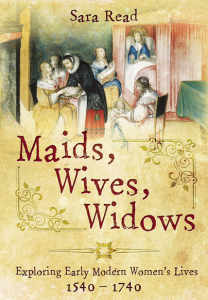
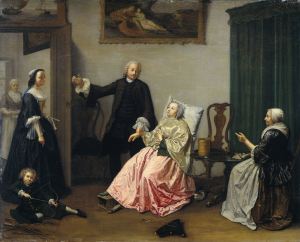
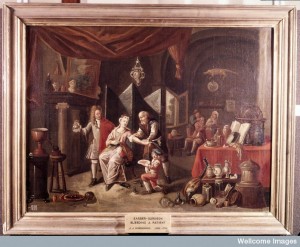
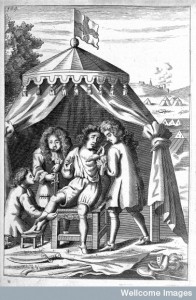
One thought on “Misfortune Managed”
Comments are closed.